专题八 动词和动词短语 课件(共91张PPT) 2025年中考英语译林版语法专项复习(江苏)
文档属性
| 名称 | 专题八 动词和动词短语 课件(共91张PPT) 2025年中考英语译林版语法专项复习(江苏) |
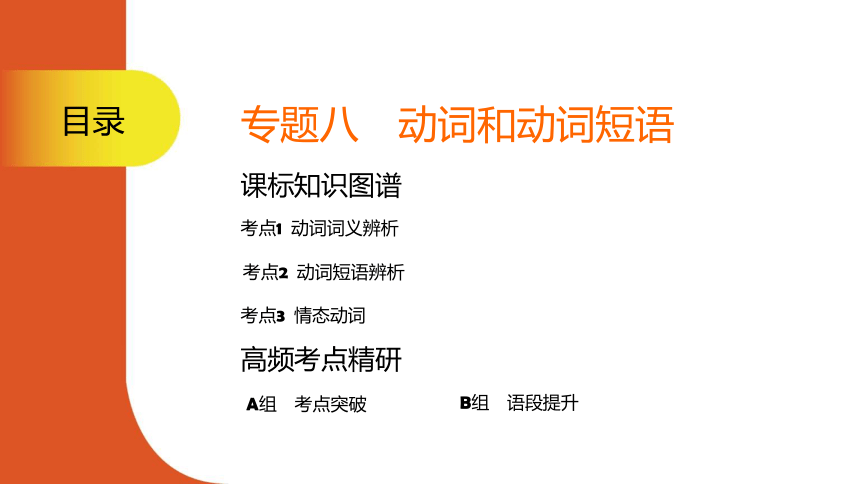
|
|
| 格式 | pptx | ||
| 文件大小 | 1.3MB | ||
| 资源类型 | 教案 | ||
| 版本资源 | 牛津译林版 | ||
| 科目 | 英语 | ||
| 更新时间 | 2024-12-09 00:00:00 | ||
图片预览


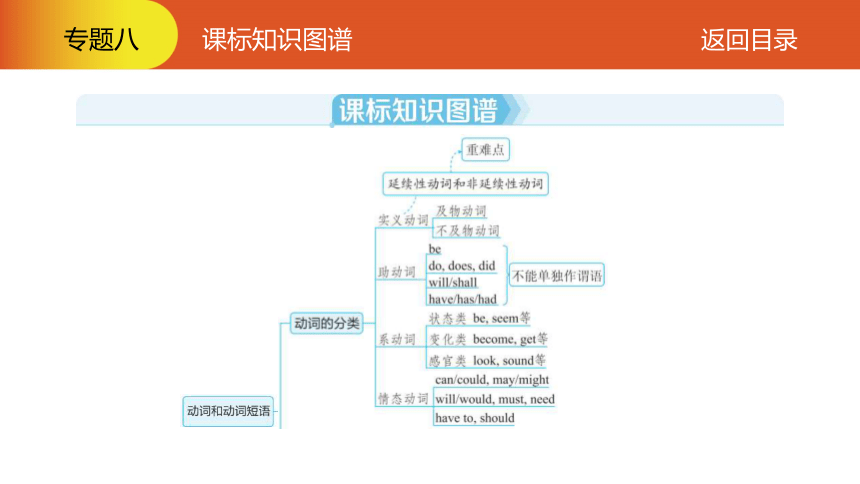
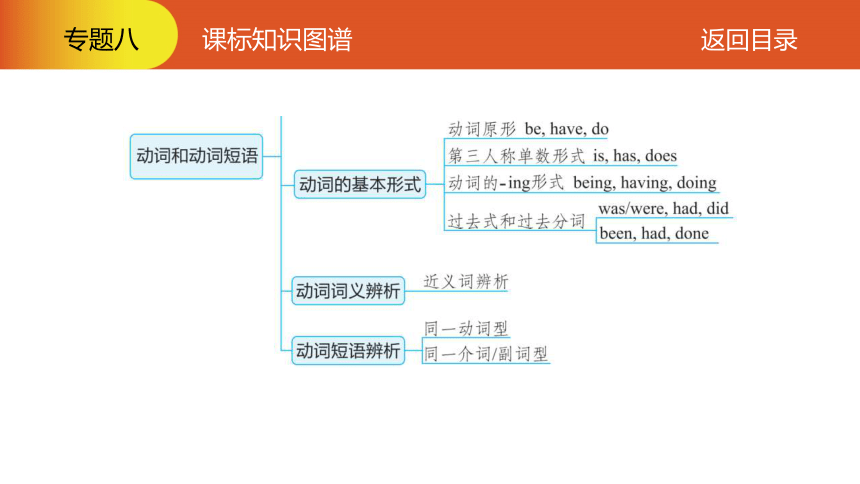

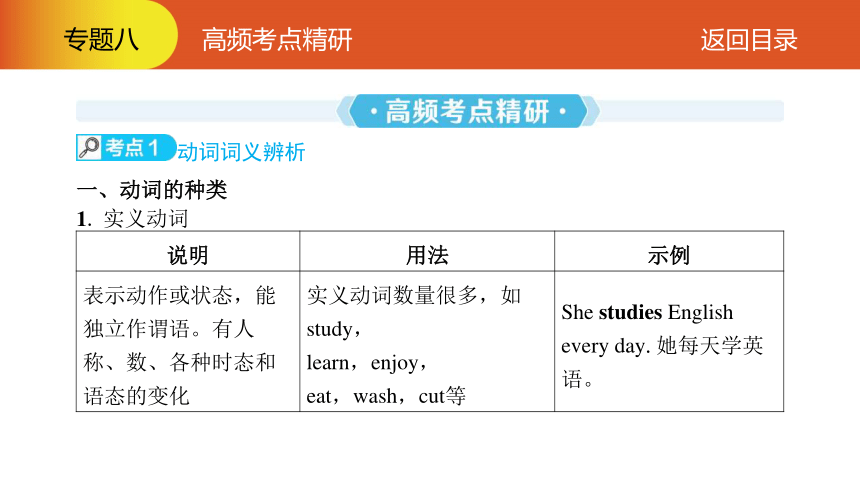
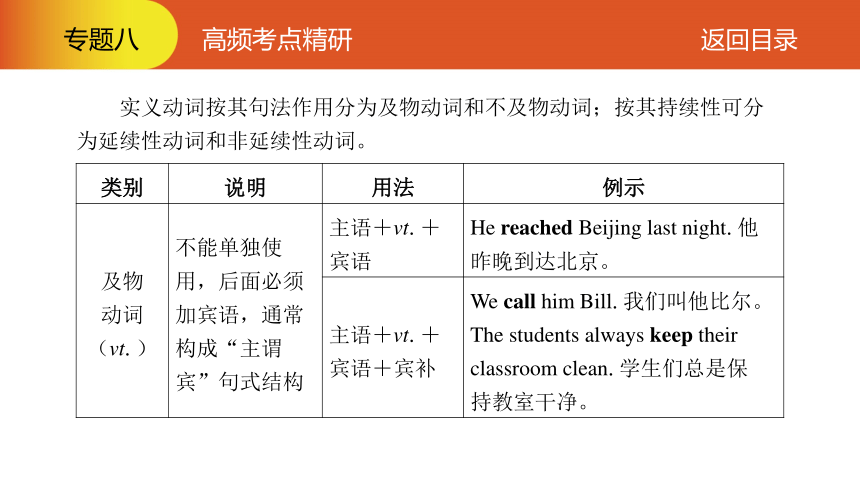
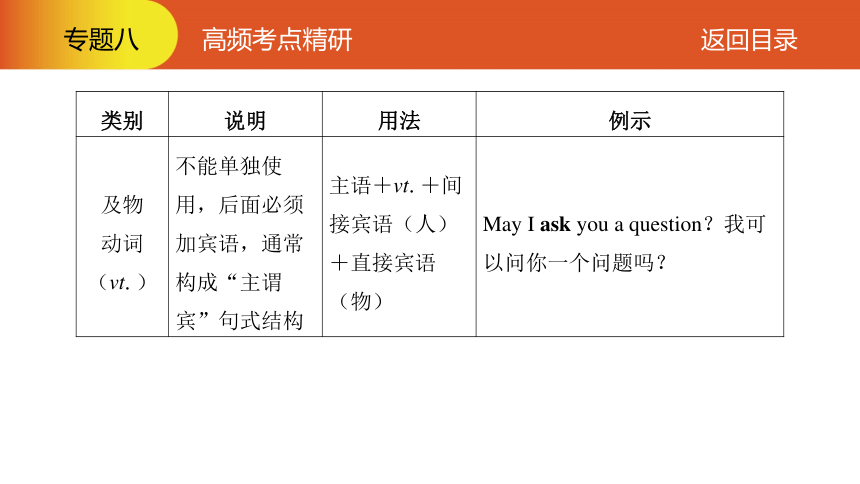
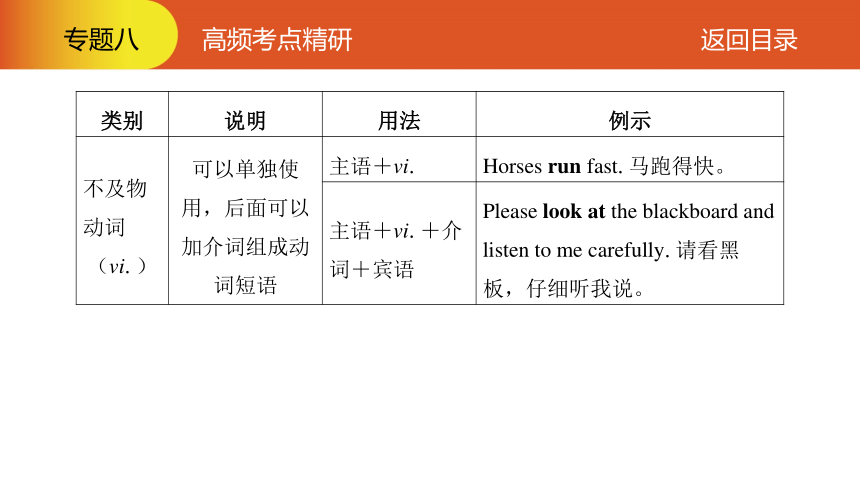
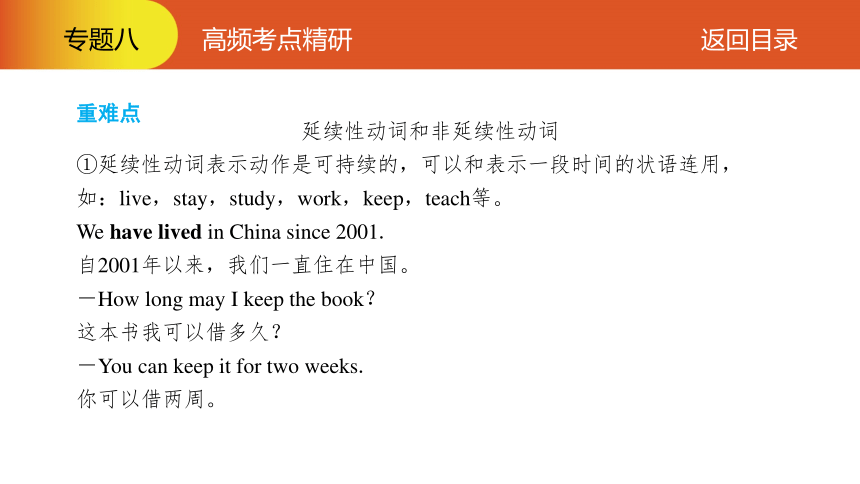
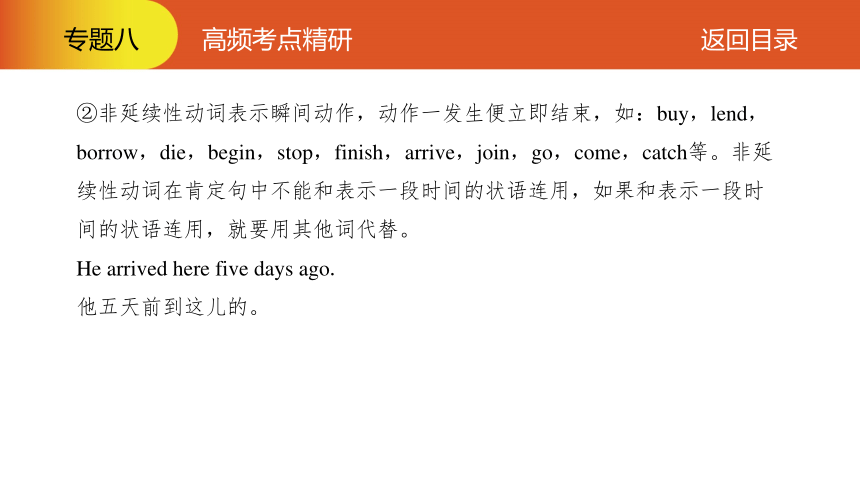
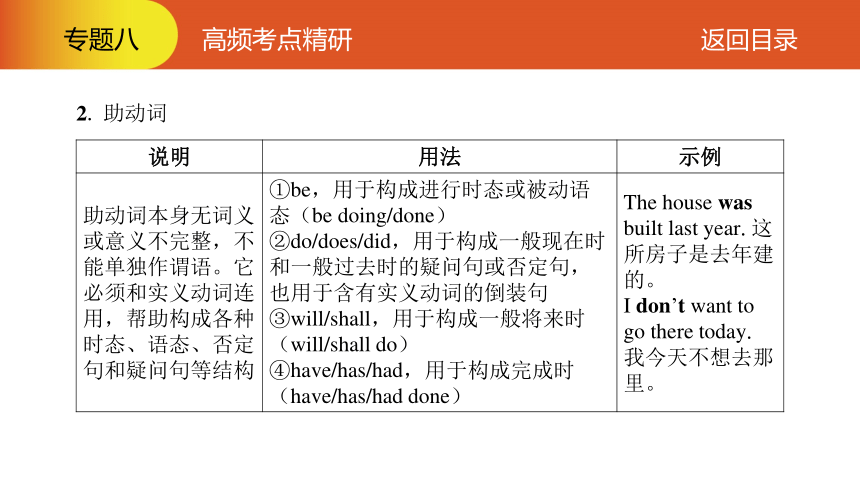
文档简介
(共91张PPT)
目录
课标知识图谱
高频考点精研
专题八 动词和动词短语
考点1 动词词义辨析
考点2 动词短语辨析
考点3 情态动词
A组 考点突破
B组 语段提升
课标知识图谱
1
高频考点精研
2
动词词义辨析
一、动词的种类
1. 实义动词
说明 用法 示例
表示动作或状态,能
独立作谓语。有人
称、数、各种时态和
语态的变化 实义动词数量很多,如
study, learn,enjoy, eat,wash,cut等 She studies English
every day.她每天学英
语。
实义动词按其句法作用分为及物动词和不及物动词;按其持续性可分
为延续性动词和非延续性动词。
类别 说明 用法 例示
及物 动词 (vt.) 不能单独使
用,后面必须
加宾语,通常
构成“主谓
宾”句式结构 主语+vt.+宾语 He reached Beijing last night.他
昨晚到达北京。
主语+vt.+宾语+宾补 We call him Bill.我们叫他比尔。
The students always keep their
classroom clean.学生们总是保
持教室干净。
类别 说明 用法 例示
及物 动词 (vt.) 不能单独使
用,后面必须
加宾语,通常
构成“主谓
宾”句式结构 主语+vt.+间
接宾语(人)
+直接宾语
(物) May I ask you a question?我可
以问你一个问题吗?
类别 说明 用法 例示
不及物 动词 (vi.) 可以单独使
用,后面可以
加介词组成动
词短语 主语+vi. Horses run fast.马跑得快。
主语+vi.+介
词+宾语 Please look at the blackboard and
listen to me carefully.请看黑
板,仔细听我说。
重难点
延续性动词和非延续性动词
①延续性动词表示动作是可持续的,可以和表示一段时间的状语连用,
如:live,stay,study,work,keep,teach等。
We have lived in China since 2001.
自2001年以来,我们一直住在中国。
-How long may I keep the book?
这本书我可以借多久?
-You can keep it for two weeks.
你可以借两周。
②非延续性动词表示瞬间动作,动作一发生便立即结束,如:buy,lend,
borrow,die,begin,stop,finish,arrive,join,go,come,catch等。非延
续性动词在肯定句中不能和表示一段时间的状语连用,如果和表示一段时
间的状语连用,就要用其他词代替。
He arrived here five days ago.
他五天前到这儿的。
2. 助动词
说明 用法 示例
助动词本身无词义
或意义不完整,不
能单独作谓语。它
必须和实义动词连
用,帮助构成各种
时态、语态、否定
句和疑问句等结构 ①be,用于构成进行时态或被动语
态(be doing/done) ②do/does/did,用于构成一般现在时
和一般过去时的疑问句或否定句,
也用于含有实义动词的倒装句 ③will/shall,用于构成一般将来时
(will/shall do) ④have/has/had,用于构成完成时
(have/has/had done) The house was
built last year.这
所房子是去年建
的。
I don’t want to
go there today.
我今天不想去那
里。
3. 系动词
说明 用法 示例
本身有意义,但
不能单独作谓
语,必须和表语
一起构成系表结
构,而且有人
称、数和各种时
态的变化 ①状态类:be(是), seem(好像,似
乎),keep(保持),remain(保
持),stay(保持)等 ②感官类:look(看起来),sound(听
起来),smell(闻起来),taste(尝起
来),feel(摸起来) ③变化类:become(变得),get(成
为,变得),turn(变得)等 He is strong.
他很强壮。
It sounds
great!那听起
来很棒!
4. 情态动词
说明 用法 示例
词义不完整,不能单独
作谓语,后接动词原形
一起构成谓语,大多无
人称和数的变化 can/could,may/might,
will/would,must,
need,have to,should等 I can swim.我会游泳。
I have to go.我得走
了。
二、动词的基本形式
形式 构成 示例
动词原形 基本形式 be,have,do,learn
第三人称 单数形式 一般在动词后直接加-s run runs
think thinks
形式 构成 示例
第三人称 单数形式 以ch,sh,s,o,x结尾的动词后加-es teach teaches
wash washes
go goes
pass passes
mix mixes
以辅音字母加y结尾的动词,先将y变成
i,再加-es study studies
carry carries
形式 构成 示例
动词的-
ing形式 一般在动词后直接加-ing read reading
cook cooking
以不发音的字母e结尾的动词,去掉e,再
加-ing live living
write writing
以重读闭音节结尾的动词,且末尾只有
一个辅音字母,双写该辅音字母后再加
-ing sit sitting
begin beginning
少数几个以ie结尾的动词要变ie为y,再加
-ing die dying
lie lying
tie tying
形式 构成 例词
过去式和过去 分词(规则变化) 一般在动词后直接加-ed work worked
play played
以字母e结尾的动词,直接加-d invite invited
promise promised
形式 构成 例词
过去式和过去 分词(规则变化) 以重读闭音节结尾的动词,且
末尾只有一个辅音字母,双写
该辅音字母后再加-ed stop stopped
plan planned
以辅音字母加y结尾的动词,
先将y变为i,再加-ed carry carried
study studied
(动词过去式和过去分词的不规则变化见附录一)
三、近义词辨析
1. invent/create/discover
invent 意为“发明,创造”,常指发明以往没有的东西
create 意为“创造,创作”,其后常接painting, song等文艺作品
discover 指“发现或找到”某种自然界本来就存在,但以前未被人类发现或认识的事物,也可指出乎意料地发现某物
2. lie/lay
lie 作动词,意为“躺;位于”, 过去式为lay,过去分词为lain,
现在分词为lying
作动词,意为“说谎”, 过去式为lied,过去分词为lied,现在
分词为lying
lay 作动词,意为“下蛋;放置”,过去式为laid,过去分词为
laid,现在分词为laying
3. provide/offer
provide 作及物动词,意为“提供”。常见搭配provide sb with sth意为“为某人提供某物”,相当于provide sth for sb
offer 作及物动词,意为“拿出,提供;(主动)提出要做某事”。常见搭配offer sb sth=offer sth to sb意为“向某人提供某物”;offer to do sth意为“主动去做某事”
4. leave/forget
leave 指“遗忘某物在某地”,其后必须接地点或场所。常用结构
“leave sth+ 地点”意为“把某物忘在某地”
forget 意为“忘记,遗忘”,主要强调遗忘了某件事或某件东西,
其后不接表示地点的状语,即forget sth意为“忘记某事”。
forget to do sth意为“忘记要做某事(未做)”,forget doing
sth意为“忘记做过某事(已做)”
5. separate/divide
separate 通常指构成整体的人物、团体、机构或部件等“拆开,分
散”,或指由于事物的阻隔而彼此分离,常用于separate into
或separate … from …结构
divide 常指分成部分、块或组等,或把某物切割分成若干份,也可
用于抽象意义的划分、割裂,常用于divide … into … 结构,
意为“把……分成……”
动词短语辨析
1. 同一动词型
agree agree on意见一致
agree to do sth同意做某事
agree with同意某人的意见
ask ask for要;请求
ask sb for sth向某人要某物
ask sb to do sth要求某人做某事
call call at sp停靠 call on拜访某人
call for a doctor去请医生
call for需要;要求;邀约(人);取(物)
call in 请来;收回
call up打电话;征召;回想起
carry carry away拿走 carry off赢得
carry on继续做 carry out执行;进行
catch catch fire着火;烧着 catch up with赶上
catch hold of sth抓住某物
come come across碰见
come along过来;快点
come back to life苏醒过来
come into 进入 come out出来;出版
come to an end结束 come true实现
come up with提出,想出
die die from死于……(外因)
die of死于……(内因) die out灭绝
get get away离开 get back回来;取回
get in a word插话
get in touch with同……取得联系
get into trouble陷入麻烦
get into进入;陷入 get off下车
get on/along well with与……相处融洽
get on上车 get up起床
get out of从……出来,摆脱
get through通过;接通;完成;经历
get together相聚 get to到达
give give away分发;捐赠;泄露
give back归还;恢复
give in屈服;投降 give off放出
give out用完;耗尽 give up放弃
go go against违背 go ahead继续;干吧
go back回到,追溯 go beyond超过
go by(时间)过去;经过(地点)
go down下降,下沉
go for运用于,应用于 go in for参加,爱好
go on to do sth 接着做另外的事
go on (doing sth)继续(做某事)
go out (灯、火)熄灭 go over检查;复习
go through完成;通过;经历;仔细研究
go up上升,上涨
go without没有……也行 go with相配
hold hold back阻止;控制
hold one’s breath憋住气,屏息
hold out坚持;拿出
hold up举起;阻滞(交通等);耽搁
look look after照顾 look down upon瞧不起
look forward to盼望 look for寻找
look into调查 look like看起来
look on…as (=treat/consider/take/think of…as)把……看作 look
up抬头;查阅
look out小心 look through浏览
make make a living谋生
make a promise许诺言
make progress进步
make room for给……腾地方
make up one’s mind下决心
make up组成;化妆;打扮;补充;弥补;编造;捏造
put put away放好;收起来
put down记下;平息 put off延期;拖延
put on穿上;上演;增加
put out扑灭;出版
put through (打电话)把……接通
put up举起;建造;张贴;公布,让……留宿
send send for派人去请
send off寄出;给……送行
send out发出(光亮等) send up发射
send sb sth=send sth to sb把某物寄给某人
take take away拿走 take it easy别着急
take off脱掉;起飞;突然成功
take one’s place就座;代替某人职位
take on雇用,接受(工作),呈现(品质、面貌)
take part in参加 take place发生
take pride in以……而自豪
take up占用(时间;空间);从事
take…out拿出去
turn turn against背叛 turn down开小(音量)
turn into变成 turn in交出;上交
turn off关上(电灯等)
turn on打开(电灯等)
turn out结果是;关掉;生产
turn over翻转
turn to找……寻求帮助;翻到;转向
turn up出现;开大(音量);到达,发现
2. 同一介词/副词型
同一介词、副词 词义 常用短语
about 关于 care about关心;在意
hear about听说
think about思考;考虑
dream about梦想;梦到
worry about 担心;烦恼
complain about抱怨
同一介词、副词 词义 常用短语
away (时间或空间上)离开(某距离) go away走开
throw away扔掉;抛弃
stay/keep away from远离
run away 跑开;逃跑
去别处 move away 搬走
离开,不在 pass away去世
同一介词、副词 词义 常用短语
back 回原处 come back回来;回忆起
go back回去
回想;记忆 bring back使回想起;恢复look back at回顾
回应 talk back顶嘴
同一介词、副词 词义 常用短语
off 不工作; 休息 put off 拖延shut off关闭;停止运转turn off
关掉(水、电、电视等)
除去 cut off切除;切断
pay off偿清(欠款等)
同一介词、副词 词义 常用短语
off 释放;放出 give off 发出,放出(光、热等)
go off(警报器)响起
show off炫耀
离开 (某处) set off出发;动身
see off送别
同一介词、副词 词义 常用短语
on 表示 “持续性” carry on继续
go on继续
hang on稍等;坚持不懈
登上 (车辆) get on上车;进展
穿着,戴着 put on穿上;上演;增加体重 try on试穿
其他 depend on取决于;依靠
hold on抓住;坚持;等一等(别挂电话)
同一介词、副词 词义 常用短语
out (从……) 出来 point out指出 go out 外出
set out 出发;开始
take out 拿出;取出
除掉;清除 clear out清理;丢掉
leave out不提及;不包括
公开;发行 come out开花;出现,显露;出版
没有;缺少 die out 灭绝;消失
run out用光;用尽
同一介词、副词 词义 常用短语
out 其他 act out将……表演出来
blow out吹灭
break out爆发
bring out使显现;使表现出
find out查明;弄清
hand out分发
work out计算出;解出;想出
try out试验
同一介词、副词 词义 常用短语
up 向上,起来 get up起床cheer up使振作
pick up捡起;拾起;开车接
grow up长大
完全,彻底 eat up吃完
use up用完;耗尽
同一介词、副词 词义 常用短语
up 其他 end up最终成为
sit/stay up熬夜
give up放弃
tidy up收拾,整理
set up建立;设立;开办
同一介词、副词 词义 常用短语
for (表示对象、用途 等)给,对 care for照顾;关心
look for寻找
prepare for为……做准备
stand for代表
leave for前往
同一介词、副词 词义 常用短语
for 往,向 care for照顾;关心
look for寻找
prepare for为……做准备
stand for代表
leave for前往
情态动词
1. can的用法
意义及用法 例句
表示能力,意为“能,会” Tom can swim well.汤姆游泳游得好。
表示请求、允许,意为“可
以” Can I use your pen?我可以用一下你的钢笔
吗?
意义及用法 例句
否定形式为can’t,可表示能
力,意为“不会,不能”;
也可表示否定推测,语气强
烈,意为“一定不,不可
能” I can’t skate.我不会滑冰。
He can’t be Mr.Wang because Mr.Wang has
gone to Beijing.他不可能是王先生,因为王
先生去北京了。
2. could的用法
意义及用法 例句
表示过去的能力,意为“能,
会”,其否定形式为couldn’t zHe could ride a bike when he was four.他
四岁的时候就会骑自行车了。
在疑问句中表示委婉的请求,
回答常用can或can’t -Could I use your bike for a while?我可以
用一会儿你的自行车吗?
-Sure, you can./No, you can’t.当然,
你可以。/不,你不可以。
意义及用法 例句
表推测,意为“有可能,也
许”,语气缓和,较委婉 It could be Lily’s.It has her handwriting.它
可能是莉莉的,上面有她的字。
3. must的用法
意义及用法 示例
表示主观看法,意为“必
须,一定”。 “Must I…?”句型的否定
回答常用needn’t或don’t
have to Don’t be late for school.We must be on time.上
学不要迟到。我们必须准时。
-Must I go home now?——我现在必须回家
吗?
-No,you needn’t/don’t have to.——不,你
不必。
意义及用法 示例
表示非常有把握的肯定推
测,意为“一定,肯定” -There’s someone knocking on the door.有人
在敲门。
-It must be Jim.肯定是吉姆。
否定形式为mustn’t,意为
“一定不要,禁止” Little kids mustn’t sit in the front seat of a car.
小孩子禁止坐在小汽车的前座。
辨析
can’t和mustn’t的区别
can’t表否定推测;mustn’t表示“禁止,不允许”,不能用来表推测。
You’ve just had lunch.You can’t be hungry now.
你刚吃了午饭。你现在肯定不饿。
You mustn’t smoke in the hospital.
你不能在医院里抽烟。
4. may的用法
意义及用法 示例
表示请求、许可,意为“可
以”。“May I…?”句型的否定回答常用can’t或
mustn’t -May I come in?——我可以进来吗?
-You may come in if you wish./No, you
can’t/mustn’t.——你想进来就进来吧。/不,你不能。
表示把握不大的推测,意为“有可能,也许” He may come tomorrow.
他明天可能会来。
5. might的用法
意义及用法 示例
表示请求、许可,语气比
may更委婉 Might I ask you a question?我可以问你一个
问题吗?
表示推测,意为“有可能,
也许”,可能性低于may,
语气缓和,较委婉 She might go swimming.She likes swimming.
她有可能去游泳了。她喜欢游泳。
①在肯定句中,常用may表示可能性。
You had better ask that policeman.He may know.你最好问那个警察,他可能知道。
②在否定句中,cannot/can’t语气肯定,表示“不可能”;may not语气不肯定,表
示“可能不”。
Mr.Li can’t be in the classroom.He has gone to Beijing.李老师不可能在教室里,他
去北京了。
-Is John coming by train?约翰是坐火车来吗?
-He should, but he may not. He likes driving his car.他应该坐火车,但可能不
坐。他喜欢开他的小汽车。
辨析
can 和may表可能性时的区别
6. need的用法
意义及用法 示例
表示必要性,主要用于否定
句或疑问句中 Need I stay here?我有必要留在这儿吗?
否定形式为needn’t,意为
“不必,没有必要” You needn’t come to school so early.你不必
这么早来学校。
用need提问时,肯定回答用must,否定回答用needn’t或don’t have to,
意为“不需要,不必”。
-Need I hand in my homework now?我需要现在就交作业吗?
-Yes,you must./No,you needn’t.是的,你必须交。/不,你不必。
易错点
拓展
need既可作情态动词也可作实义动词。用作实义动词时有人称和数的变化,可
用于肯定句、否定句或疑问句中,构成否定句或疑问句时要用助动词do,does,
did;need作实义动词时,表示“需要”,用于以下结构中:need sth;need to do
sth(需要做某事);need doing(需要被做)
He doesn’t need to do it.
他不需要做那件事。
We students need to study hard to achieve success.我们学生需要努力学习以
获得成功。
The floor needs sweeping.=The floor needs to be swept.地面需要打扫了。
7. should的用法
意义及用法 示例
表示要求和命令,也可以表
示劝告或建议,意为“应
该” We should eat healthy food.我们应该吃健康
的食物。
表示征询意见,常用于疑问
句中 Who should we ask?我们应该请教谁?
否定形式为shouldn’t,意为
“不应该” You shouldn’t tell lies.你不应该撒谎。
8. shall的用法
意义及用法 示例
表示请求或征求对方意见,多用于第一或第三人称,构成疑问句 Shall I open the window?我把窗户打开好吗?
表示决心、警告、命令,多
用于第二人称 You shall not talk loudly at the cinema.你(们)不许在电影院内大声喧哗。
9. would的用法
意义及用法 示例
表示说话人的意愿 I’d love a coffee.
我想喝杯咖啡。
客气地建议或邀请 Would you like a sandwich?您来一个三明治
吗?
用于第二人称,表示向
对方提出请求 Would you tell me the way to the airport?你能告
诉我去机场的路吗?
表示过去的习惯 He would take a walk after dinner.以前他晚饭后
常常去散步。
10. have to的用法
意义及用法 示例
表示客观需要,意为
“不得不” I have to stay at home,for my sister is ill.我不得不
待在家里,因为我的妹妹生病了。
否定形式don’t have
to,意为“不必” You don’t have to come if you don’t want to.如果你
不想来,你就不必来。
must表示主观意愿,意为“必须”;have/has to强调客观需要,意为“必须,
不得不”。
We must get together sometime.
我们一定要找个时间聚一下。
I have to clock in by eight.
我必须八点前打卡上班。
辨析
must和have/has to的区别
A组 考点突破
考点1 动词词义辨析
1. (2024无锡)I couldn’t what else he has to say. Everyone knows that’s
a lie.
A. suppose B. imagine
C. realize D. consider
B
2. (2024连云港)The movie Chang An China’s rich history
and culture to people around the world.
A. protects B. compares
C. introduces D. discovers
3. (2024南京鼓楼一模)The TV show A journey built around good taste
brings some guests to visit cities around China and the local cooking style.
A. explore B. follow
C. improve D. protect
C
A
4. (2024南京秦淮一模)With a broad knowledge of Chinese and history, he
always to express his opinions using ancient Chinese sayings.
A. refuses B. manages
C. fails D. warns
5. (2024南通崇川、如皋一模) The talented painter Pablo Picasso once
said, “Every child is an artist. The problem is how to an artist once he
grows up.”
A. remind B. respect
C. remain D. require
B
C
6. (2024南通海安一模)A fall of snow gives promise of a fruitful year.
Farmers welcome snow because snow can crops from cold fronts (冷锋)
and keep the fields warm.
A. protect B. prevent
C. provide D. present
7. (2024南通海门一模)-I have had a bad cough these days.
-I strongly you to give up smoking. It does great harm to your health.
A. invite B. advise C. follow D. allow
A
B
8. (2024徐州新沂一模)-I don’t know where to go during Chinese New
Year.
-Why not visiting Xuzhou? There are many places of interest.
A. regard B. consider
C. risk D. suggest
9. (2024扬州邗江梅岭中学一模)-Foreigners can hardly ever Chinese
products.
-Yes, “made in China” can be seen all over the world.
A. reduce B. avoid C. insist D. allow
B
B
10. (2024南京江宁高新区中学三模)Don’t always yourself with
others. You can be anything you want to be.
A. share B. discuss
C. connect D. compare
11. (2024徐州二模)After winter leaves, the temperature , and the
natural world comes to life again.
A. drops B. stays C. rises D. raises
D
C
考点2 动词短语辨析
12. (2024连云港)To live a green life, we should remember to the
lights when we leave a room.
A. turn on B. turn off
C. turn up D. turn down
13. (2024无锡)I know how busy you are and I won’t too much of your
time.
A. take up B. set up
C. make up D. put up
B
A
14. (2024镇江)- Mum, could you please the poster in my bedroom?
I really like it!
- Sure, baby.
A. give up B. take up
C. put up D. mop up
15. (2024常州)-Which school club should I choose?
-It what skills you want to develop.
A. takes on B. carries on
C. puts on D. depends on
C
D
16. (2024宿迁)In Switzerland, a country with high mountains and clean
blue lakes, people its rich resources to live.
A. carry on B. try on
C. depend on D. put on
17. (2024泰州泰兴一模)Our government should strict rules to prevent
campus bullying (校园霸凌) so that the students can be protected well at
school.
A. turn out B. send out
C. run out D. carry out
C
D
18. (2024无锡高新区金桥外国语学校一模)Physical work plays an
important role in developing students’ view of the world and life. That’s why we
need to labour education at school. 重难点拨
A. find out B. carry out
C. turn out D. give out
19. (2024南京鼓楼三模)The temperature will quickly zero when winter
is coming.
A. drop below B. drop down
C. down to D. down after
B
A
20. (2023南通)The wind energy costs very little and will
never .Besides, it produces little pollution.
A. blow out B. run out
C. put out D. break out
21. (2023泰州)Most neighbours the habit of square dancing to create a
quieter environment for us.
A. get into B. care about
C. carry on D. give up
B
D
22. (2023徐州)I loved the book so much that I could hardly .
A. put it up B. put it down
C. put it on D. put it out
B
考点3 情态动词
23. (2024无锡)Shh… ! This is a library. You keep your voice down.
A. can B. can’t C. should D. shouldn’t
24. (2024连云港)Modern medicine is developing quickly and now most eye
problems be cured.
A. can B. must C. should D. need
25. (2024镇江)With the help of modern technology, now people enjoy
the proudest moment when China’s first astronaut Yang Liwei entered space.
A. may B. can C. should D. must
C
A
B
26. (2024常州)When you make a fresh salad, you add your favorite
fruit if you would like to.
A. may B. should C. must D. have to
27. (2024宿迁)Although the little boy is only 6 years old, he do DIY
well with his special mind.
A. can B. can’t C. must D. mustn’t
28. (2024连云港赣榆一模)To learn better, we listen carefully in class
and keep thinking actively.
A. could B. would C. should D. might
A
A
C
29. (2024南通崇川、如皋一模)-Do you know the saying “When I walk
along with two others, they serve me as my teachers.”?
-Yes. It tells us we can learn from the people around us.
A. may B. must C. should D. need
A
30. (2024南通通州一模)-Sir, may I park my car here?
-Sorry, look at the sign. You park your car here.
A. could’t B. may
C. mustn’t D. needn’t
C
31. (2024宿迁宿豫一模) With the development of AI technology,
people stand at the gate and welcome the guests because the robots can do
that.
A. mustn’t B. shouldn’t
C. can’t D. needn’t
32. (2024无锡高新区金桥外国语学校一模) You be hungry already-
you had lunch only two hours ago.
A. mustn’t B. can’t
C. needn’t D. shouldn’t
D
B
33. (2024无锡新吴一模)-How amazing this home robot is! It can clean
the floor by itself!
-Yeah. It receive the order through the phone.
A. can B. can’t
C. should D. shouldn’t
34. (2024徐州邳州运河中学一模) Sending people to Mars happen if
scientists find ways to supply humans with enough air, water and food.
A. can B. must C. should D. need
A
A
35. (2024南通海安十三校联考二模)-What do you think we can do for our
aged parents?
-You do anything except be with them as much as possible.
A. shouldn’t B. needn’t
C. mustn’t D. can’t
B
36. (2024南通启东二模)-Have you taken the MBTI test to
know your personality type?
-Not yet. I be an “E” person because I love sharing my thoughts, but
I’m not so sure.
A. may B. must
C. need to D. ought to
37. (2023南通)If a football team wants to enter the World Cup, it
become a member of FIFA first.
A. may B. must C. can D. might
A
B
38. (2023无锡)Oh, come on! you doubt everything I say? I’m not
a three-year-old!
A. Can’t B. Can C. Mustn’t D. Must
39. (2023常州)When you have fixed this type of lock,you take a key
with you. You can open the door with your fingerprint.
A. shouldn’t B. needn’t
C. mustn’t D. can’t
D
B
40. (2023连云港)Earthquakes can be very dangerous.We learn to
protect ourselves.
A. might B. should C. could D. would
B
B组 语段提升
阅读下面短文,用括号内所给词的适当形式填空,必要时可加助动词
或情态动词
The year 2024 celebrates the Chinese Year of the Dragon. It is respected as a
1. (luck) year, full of hope for all.
lucky
Chinese people respect the dragon, and even see themselves as the
descendants (后代) of the dragon. In Chinese culture, the dragon is a
symbol of power and good luck. People believe it controls the water and brings a
good harvest. So they have 2. (admire) the dragon since ancient
times. And people who are born in the dragon year are thought to be confident
and unafraid to take risks.
admired
But how did the dragon become one of the twelve 3. (animal)
in the Chinese zodiac (生肖)? According to the legend, there was a party,
the order of the zodiac animals would be decided by the order in which they
arrive. The dragon, although it had the ability to 4. (fly), didn’t
come first because it stopped to make rain for farmers on 5. (it) way.
So, it was the 6. (five) one to arrive.
animals
fly
its
fifth
To show great respect towards the dragon, Dragon Dance was
7. (start) by the Chinese during the Han Dynasty. Now it has been
spread all over the world. The length of dragons can be 50 to 70 meters because
people believe that the 8. (long) the dragon is, the more luck it
will bring. But a small group 9. (not run) a very long dragon
because it needs great human power, much money, and special skills.
The dragon is not just an animal in the Chinese zodiac, it’s also a powerful
symbol that is rooted (根植) 10. (deep) in Chinese history and
customs.
started
longer
can’t run
deeply
目录
课标知识图谱
高频考点精研
专题八 动词和动词短语
考点1 动词词义辨析
考点2 动词短语辨析
考点3 情态动词
A组 考点突破
B组 语段提升
课标知识图谱
1
高频考点精研
2
动词词义辨析
一、动词的种类
1. 实义动词
说明 用法 示例
表示动作或状态,能
独立作谓语。有人
称、数、各种时态和
语态的变化 实义动词数量很多,如
study, learn,enjoy, eat,wash,cut等 She studies English
every day.她每天学英
语。
实义动词按其句法作用分为及物动词和不及物动词;按其持续性可分
为延续性动词和非延续性动词。
类别 说明 用法 例示
及物 动词 (vt.) 不能单独使
用,后面必须
加宾语,通常
构成“主谓
宾”句式结构 主语+vt.+宾语 He reached Beijing last night.他
昨晚到达北京。
主语+vt.+宾语+宾补 We call him Bill.我们叫他比尔。
The students always keep their
classroom clean.学生们总是保
持教室干净。
类别 说明 用法 例示
及物 动词 (vt.) 不能单独使
用,后面必须
加宾语,通常
构成“主谓
宾”句式结构 主语+vt.+间
接宾语(人)
+直接宾语
(物) May I ask you a question?我可
以问你一个问题吗?
类别 说明 用法 例示
不及物 动词 (vi.) 可以单独使
用,后面可以
加介词组成动
词短语 主语+vi. Horses run fast.马跑得快。
主语+vi.+介
词+宾语 Please look at the blackboard and
listen to me carefully.请看黑
板,仔细听我说。
重难点
延续性动词和非延续性动词
①延续性动词表示动作是可持续的,可以和表示一段时间的状语连用,
如:live,stay,study,work,keep,teach等。
We have lived in China since 2001.
自2001年以来,我们一直住在中国。
-How long may I keep the book?
这本书我可以借多久?
-You can keep it for two weeks.
你可以借两周。
②非延续性动词表示瞬间动作,动作一发生便立即结束,如:buy,lend,
borrow,die,begin,stop,finish,arrive,join,go,come,catch等。非延
续性动词在肯定句中不能和表示一段时间的状语连用,如果和表示一段时
间的状语连用,就要用其他词代替。
He arrived here five days ago.
他五天前到这儿的。
2. 助动词
说明 用法 示例
助动词本身无词义
或意义不完整,不
能单独作谓语。它
必须和实义动词连
用,帮助构成各种
时态、语态、否定
句和疑问句等结构 ①be,用于构成进行时态或被动语
态(be doing/done) ②do/does/did,用于构成一般现在时
和一般过去时的疑问句或否定句,
也用于含有实义动词的倒装句 ③will/shall,用于构成一般将来时
(will/shall do) ④have/has/had,用于构成完成时
(have/has/had done) The house was
built last year.这
所房子是去年建
的。
I don’t want to
go there today.
我今天不想去那
里。
3. 系动词
说明 用法 示例
本身有意义,但
不能单独作谓
语,必须和表语
一起构成系表结
构,而且有人
称、数和各种时
态的变化 ①状态类:be(是), seem(好像,似
乎),keep(保持),remain(保
持),stay(保持)等 ②感官类:look(看起来),sound(听
起来),smell(闻起来),taste(尝起
来),feel(摸起来) ③变化类:become(变得),get(成
为,变得),turn(变得)等 He is strong.
他很强壮。
It sounds
great!那听起
来很棒!
4. 情态动词
说明 用法 示例
词义不完整,不能单独
作谓语,后接动词原形
一起构成谓语,大多无
人称和数的变化 can/could,may/might,
will/would,must,
need,have to,should等 I can swim.我会游泳。
I have to go.我得走
了。
二、动词的基本形式
形式 构成 示例
动词原形 基本形式 be,have,do,learn
第三人称 单数形式 一般在动词后直接加-s run runs
think thinks
形式 构成 示例
第三人称 单数形式 以ch,sh,s,o,x结尾的动词后加-es teach teaches
wash washes
go goes
pass passes
mix mixes
以辅音字母加y结尾的动词,先将y变成
i,再加-es study studies
carry carries
形式 构成 示例
动词的-
ing形式 一般在动词后直接加-ing read reading
cook cooking
以不发音的字母e结尾的动词,去掉e,再
加-ing live living
write writing
以重读闭音节结尾的动词,且末尾只有
一个辅音字母,双写该辅音字母后再加
-ing sit sitting
begin beginning
少数几个以ie结尾的动词要变ie为y,再加
-ing die dying
lie lying
tie tying
形式 构成 例词
过去式和过去 分词(规则变化) 一般在动词后直接加-ed work worked
play played
以字母e结尾的动词,直接加-d invite invited
promise promised
形式 构成 例词
过去式和过去 分词(规则变化) 以重读闭音节结尾的动词,且
末尾只有一个辅音字母,双写
该辅音字母后再加-ed stop stopped
plan planned
以辅音字母加y结尾的动词,
先将y变为i,再加-ed carry carried
study studied
(动词过去式和过去分词的不规则变化见附录一)
三、近义词辨析
1. invent/create/discover
invent 意为“发明,创造”,常指发明以往没有的东西
create 意为“创造,创作”,其后常接painting, song等文艺作品
discover 指“发现或找到”某种自然界本来就存在,但以前未被人类发现或认识的事物,也可指出乎意料地发现某物
2. lie/lay
lie 作动词,意为“躺;位于”, 过去式为lay,过去分词为lain,
现在分词为lying
作动词,意为“说谎”, 过去式为lied,过去分词为lied,现在
分词为lying
lay 作动词,意为“下蛋;放置”,过去式为laid,过去分词为
laid,现在分词为laying
3. provide/offer
provide 作及物动词,意为“提供”。常见搭配provide sb with sth意为“为某人提供某物”,相当于provide sth for sb
offer 作及物动词,意为“拿出,提供;(主动)提出要做某事”。常见搭配offer sb sth=offer sth to sb意为“向某人提供某物”;offer to do sth意为“主动去做某事”
4. leave/forget
leave 指“遗忘某物在某地”,其后必须接地点或场所。常用结构
“leave sth+ 地点”意为“把某物忘在某地”
forget 意为“忘记,遗忘”,主要强调遗忘了某件事或某件东西,
其后不接表示地点的状语,即forget sth意为“忘记某事”。
forget to do sth意为“忘记要做某事(未做)”,forget doing
sth意为“忘记做过某事(已做)”
5. separate/divide
separate 通常指构成整体的人物、团体、机构或部件等“拆开,分
散”,或指由于事物的阻隔而彼此分离,常用于separate into
或separate … from …结构
divide 常指分成部分、块或组等,或把某物切割分成若干份,也可
用于抽象意义的划分、割裂,常用于divide … into … 结构,
意为“把……分成……”
动词短语辨析
1. 同一动词型
agree agree on意见一致
agree to do sth同意做某事
agree with同意某人的意见
ask ask for要;请求
ask sb for sth向某人要某物
ask sb to do sth要求某人做某事
call call at sp停靠 call on拜访某人
call for a doctor去请医生
call for需要;要求;邀约(人);取(物)
call in 请来;收回
call up打电话;征召;回想起
carry carry away拿走 carry off赢得
carry on继续做 carry out执行;进行
catch catch fire着火;烧着 catch up with赶上
catch hold of sth抓住某物
come come across碰见
come along过来;快点
come back to life苏醒过来
come into 进入 come out出来;出版
come to an end结束 come true实现
come up with提出,想出
die die from死于……(外因)
die of死于……(内因) die out灭绝
get get away离开 get back回来;取回
get in a word插话
get in touch with同……取得联系
get into trouble陷入麻烦
get into进入;陷入 get off下车
get on/along well with与……相处融洽
get on上车 get up起床
get out of从……出来,摆脱
get through通过;接通;完成;经历
get together相聚 get to到达
give give away分发;捐赠;泄露
give back归还;恢复
give in屈服;投降 give off放出
give out用完;耗尽 give up放弃
go go against违背 go ahead继续;干吧
go back回到,追溯 go beyond超过
go by(时间)过去;经过(地点)
go down下降,下沉
go for运用于,应用于 go in for参加,爱好
go on to do sth 接着做另外的事
go on (doing sth)继续(做某事)
go out (灯、火)熄灭 go over检查;复习
go through完成;通过;经历;仔细研究
go up上升,上涨
go without没有……也行 go with相配
hold hold back阻止;控制
hold one’s breath憋住气,屏息
hold out坚持;拿出
hold up举起;阻滞(交通等);耽搁
look look after照顾 look down upon瞧不起
look forward to盼望 look for寻找
look into调查 look like看起来
look on…as (=treat/consider/take/think of…as)把……看作 look
up抬头;查阅
look out小心 look through浏览
make make a living谋生
make a promise许诺言
make progress进步
make room for给……腾地方
make up one’s mind下决心
make up组成;化妆;打扮;补充;弥补;编造;捏造
put put away放好;收起来
put down记下;平息 put off延期;拖延
put on穿上;上演;增加
put out扑灭;出版
put through (打电话)把……接通
put up举起;建造;张贴;公布,让……留宿
send send for派人去请
send off寄出;给……送行
send out发出(光亮等) send up发射
send sb sth=send sth to sb把某物寄给某人
take take away拿走 take it easy别着急
take off脱掉;起飞;突然成功
take one’s place就座;代替某人职位
take on雇用,接受(工作),呈现(品质、面貌)
take part in参加 take place发生
take pride in以……而自豪
take up占用(时间;空间);从事
take…out拿出去
turn turn against背叛 turn down开小(音量)
turn into变成 turn in交出;上交
turn off关上(电灯等)
turn on打开(电灯等)
turn out结果是;关掉;生产
turn over翻转
turn to找……寻求帮助;翻到;转向
turn up出现;开大(音量);到达,发现
2. 同一介词/副词型
同一介词、副词 词义 常用短语
about 关于 care about关心;在意
hear about听说
think about思考;考虑
dream about梦想;梦到
worry about 担心;烦恼
complain about抱怨
同一介词、副词 词义 常用短语
away (时间或空间上)离开(某距离) go away走开
throw away扔掉;抛弃
stay/keep away from远离
run away 跑开;逃跑
去别处 move away 搬走
离开,不在 pass away去世
同一介词、副词 词义 常用短语
back 回原处 come back回来;回忆起
go back回去
回想;记忆 bring back使回想起;恢复look back at回顾
回应 talk back顶嘴
同一介词、副词 词义 常用短语
off 不工作; 休息 put off 拖延shut off关闭;停止运转turn off
关掉(水、电、电视等)
除去 cut off切除;切断
pay off偿清(欠款等)
同一介词、副词 词义 常用短语
off 释放;放出 give off 发出,放出(光、热等)
go off(警报器)响起
show off炫耀
离开 (某处) set off出发;动身
see off送别
同一介词、副词 词义 常用短语
on 表示 “持续性” carry on继续
go on继续
hang on稍等;坚持不懈
登上 (车辆) get on上车;进展
穿着,戴着 put on穿上;上演;增加体重 try on试穿
其他 depend on取决于;依靠
hold on抓住;坚持;等一等(别挂电话)
同一介词、副词 词义 常用短语
out (从……) 出来 point out指出 go out 外出
set out 出发;开始
take out 拿出;取出
除掉;清除 clear out清理;丢掉
leave out不提及;不包括
公开;发行 come out开花;出现,显露;出版
没有;缺少 die out 灭绝;消失
run out用光;用尽
同一介词、副词 词义 常用短语
out 其他 act out将……表演出来
blow out吹灭
break out爆发
bring out使显现;使表现出
find out查明;弄清
hand out分发
work out计算出;解出;想出
try out试验
同一介词、副词 词义 常用短语
up 向上,起来 get up起床cheer up使振作
pick up捡起;拾起;开车接
grow up长大
完全,彻底 eat up吃完
use up用完;耗尽
同一介词、副词 词义 常用短语
up 其他 end up最终成为
sit/stay up熬夜
give up放弃
tidy up收拾,整理
set up建立;设立;开办
同一介词、副词 词义 常用短语
for (表示对象、用途 等)给,对 care for照顾;关心
look for寻找
prepare for为……做准备
stand for代表
leave for前往
同一介词、副词 词义 常用短语
for 往,向 care for照顾;关心
look for寻找
prepare for为……做准备
stand for代表
leave for前往
情态动词
1. can的用法
意义及用法 例句
表示能力,意为“能,会” Tom can swim well.汤姆游泳游得好。
表示请求、允许,意为“可
以” Can I use your pen?我可以用一下你的钢笔
吗?
意义及用法 例句
否定形式为can’t,可表示能
力,意为“不会,不能”;
也可表示否定推测,语气强
烈,意为“一定不,不可
能” I can’t skate.我不会滑冰。
He can’t be Mr.Wang because Mr.Wang has
gone to Beijing.他不可能是王先生,因为王
先生去北京了。
2. could的用法
意义及用法 例句
表示过去的能力,意为“能,
会”,其否定形式为couldn’t zHe could ride a bike when he was four.他
四岁的时候就会骑自行车了。
在疑问句中表示委婉的请求,
回答常用can或can’t -Could I use your bike for a while?我可以
用一会儿你的自行车吗?
-Sure, you can./No, you can’t.当然,
你可以。/不,你不可以。
意义及用法 例句
表推测,意为“有可能,也
许”,语气缓和,较委婉 It could be Lily’s.It has her handwriting.它
可能是莉莉的,上面有她的字。
3. must的用法
意义及用法 示例
表示主观看法,意为“必
须,一定”。 “Must I…?”句型的否定
回答常用needn’t或don’t
have to Don’t be late for school.We must be on time.上
学不要迟到。我们必须准时。
-Must I go home now?——我现在必须回家
吗?
-No,you needn’t/don’t have to.——不,你
不必。
意义及用法 示例
表示非常有把握的肯定推
测,意为“一定,肯定” -There’s someone knocking on the door.有人
在敲门。
-It must be Jim.肯定是吉姆。
否定形式为mustn’t,意为
“一定不要,禁止” Little kids mustn’t sit in the front seat of a car.
小孩子禁止坐在小汽车的前座。
辨析
can’t和mustn’t的区别
can’t表否定推测;mustn’t表示“禁止,不允许”,不能用来表推测。
You’ve just had lunch.You can’t be hungry now.
你刚吃了午饭。你现在肯定不饿。
You mustn’t smoke in the hospital.
你不能在医院里抽烟。
4. may的用法
意义及用法 示例
表示请求、许可,意为“可
以”。“May I…?”句型的否定回答常用can’t或
mustn’t -May I come in?——我可以进来吗?
-You may come in if you wish./No, you
can’t/mustn’t.——你想进来就进来吧。/不,你不能。
表示把握不大的推测,意为“有可能,也许” He may come tomorrow.
他明天可能会来。
5. might的用法
意义及用法 示例
表示请求、许可,语气比
may更委婉 Might I ask you a question?我可以问你一个
问题吗?
表示推测,意为“有可能,
也许”,可能性低于may,
语气缓和,较委婉 She might go swimming.She likes swimming.
她有可能去游泳了。她喜欢游泳。
①在肯定句中,常用may表示可能性。
You had better ask that policeman.He may know.你最好问那个警察,他可能知道。
②在否定句中,cannot/can’t语气肯定,表示“不可能”;may not语气不肯定,表
示“可能不”。
Mr.Li can’t be in the classroom.He has gone to Beijing.李老师不可能在教室里,他
去北京了。
-Is John coming by train?约翰是坐火车来吗?
-He should, but he may not. He likes driving his car.他应该坐火车,但可能不
坐。他喜欢开他的小汽车。
辨析
can 和may表可能性时的区别
6. need的用法
意义及用法 示例
表示必要性,主要用于否定
句或疑问句中 Need I stay here?我有必要留在这儿吗?
否定形式为needn’t,意为
“不必,没有必要” You needn’t come to school so early.你不必
这么早来学校。
用need提问时,肯定回答用must,否定回答用needn’t或don’t have to,
意为“不需要,不必”。
-Need I hand in my homework now?我需要现在就交作业吗?
-Yes,you must./No,you needn’t.是的,你必须交。/不,你不必。
易错点
拓展
need既可作情态动词也可作实义动词。用作实义动词时有人称和数的变化,可
用于肯定句、否定句或疑问句中,构成否定句或疑问句时要用助动词do,does,
did;need作实义动词时,表示“需要”,用于以下结构中:need sth;need to do
sth(需要做某事);need doing(需要被做)
He doesn’t need to do it.
他不需要做那件事。
We students need to study hard to achieve success.我们学生需要努力学习以
获得成功。
The floor needs sweeping.=The floor needs to be swept.地面需要打扫了。
7. should的用法
意义及用法 示例
表示要求和命令,也可以表
示劝告或建议,意为“应
该” We should eat healthy food.我们应该吃健康
的食物。
表示征询意见,常用于疑问
句中 Who should we ask?我们应该请教谁?
否定形式为shouldn’t,意为
“不应该” You shouldn’t tell lies.你不应该撒谎。
8. shall的用法
意义及用法 示例
表示请求或征求对方意见,多用于第一或第三人称,构成疑问句 Shall I open the window?我把窗户打开好吗?
表示决心、警告、命令,多
用于第二人称 You shall not talk loudly at the cinema.你(们)不许在电影院内大声喧哗。
9. would的用法
意义及用法 示例
表示说话人的意愿 I’d love a coffee.
我想喝杯咖啡。
客气地建议或邀请 Would you like a sandwich?您来一个三明治
吗?
用于第二人称,表示向
对方提出请求 Would you tell me the way to the airport?你能告
诉我去机场的路吗?
表示过去的习惯 He would take a walk after dinner.以前他晚饭后
常常去散步。
10. have to的用法
意义及用法 示例
表示客观需要,意为
“不得不” I have to stay at home,for my sister is ill.我不得不
待在家里,因为我的妹妹生病了。
否定形式don’t have
to,意为“不必” You don’t have to come if you don’t want to.如果你
不想来,你就不必来。
must表示主观意愿,意为“必须”;have/has to强调客观需要,意为“必须,
不得不”。
We must get together sometime.
我们一定要找个时间聚一下。
I have to clock in by eight.
我必须八点前打卡上班。
辨析
must和have/has to的区别
A组 考点突破
考点1 动词词义辨析
1. (2024无锡)I couldn’t what else he has to say. Everyone knows that’s
a lie.
A. suppose B. imagine
C. realize D. consider
B
2. (2024连云港)The movie Chang An China’s rich history
and culture to people around the world.
A. protects B. compares
C. introduces D. discovers
3. (2024南京鼓楼一模)The TV show A journey built around good taste
brings some guests to visit cities around China and the local cooking style.
A. explore B. follow
C. improve D. protect
C
A
4. (2024南京秦淮一模)With a broad knowledge of Chinese and history, he
always to express his opinions using ancient Chinese sayings.
A. refuses B. manages
C. fails D. warns
5. (2024南通崇川、如皋一模) The talented painter Pablo Picasso once
said, “Every child is an artist. The problem is how to an artist once he
grows up.”
A. remind B. respect
C. remain D. require
B
C
6. (2024南通海安一模)A fall of snow gives promise of a fruitful year.
Farmers welcome snow because snow can crops from cold fronts (冷锋)
and keep the fields warm.
A. protect B. prevent
C. provide D. present
7. (2024南通海门一模)-I have had a bad cough these days.
-I strongly you to give up smoking. It does great harm to your health.
A. invite B. advise C. follow D. allow
A
B
8. (2024徐州新沂一模)-I don’t know where to go during Chinese New
Year.
-Why not visiting Xuzhou? There are many places of interest.
A. regard B. consider
C. risk D. suggest
9. (2024扬州邗江梅岭中学一模)-Foreigners can hardly ever Chinese
products.
-Yes, “made in China” can be seen all over the world.
A. reduce B. avoid C. insist D. allow
B
B
10. (2024南京江宁高新区中学三模)Don’t always yourself with
others. You can be anything you want to be.
A. share B. discuss
C. connect D. compare
11. (2024徐州二模)After winter leaves, the temperature , and the
natural world comes to life again.
A. drops B. stays C. rises D. raises
D
C
考点2 动词短语辨析
12. (2024连云港)To live a green life, we should remember to the
lights when we leave a room.
A. turn on B. turn off
C. turn up D. turn down
13. (2024无锡)I know how busy you are and I won’t too much of your
time.
A. take up B. set up
C. make up D. put up
B
A
14. (2024镇江)- Mum, could you please the poster in my bedroom?
I really like it!
- Sure, baby.
A. give up B. take up
C. put up D. mop up
15. (2024常州)-Which school club should I choose?
-It what skills you want to develop.
A. takes on B. carries on
C. puts on D. depends on
C
D
16. (2024宿迁)In Switzerland, a country with high mountains and clean
blue lakes, people its rich resources to live.
A. carry on B. try on
C. depend on D. put on
17. (2024泰州泰兴一模)Our government should strict rules to prevent
campus bullying (校园霸凌) so that the students can be protected well at
school.
A. turn out B. send out
C. run out D. carry out
C
D
18. (2024无锡高新区金桥外国语学校一模)Physical work plays an
important role in developing students’ view of the world and life. That’s why we
need to labour education at school. 重难点拨
A. find out B. carry out
C. turn out D. give out
19. (2024南京鼓楼三模)The temperature will quickly zero when winter
is coming.
A. drop below B. drop down
C. down to D. down after
B
A
20. (2023南通)The wind energy costs very little and will
never .Besides, it produces little pollution.
A. blow out B. run out
C. put out D. break out
21. (2023泰州)Most neighbours the habit of square dancing to create a
quieter environment for us.
A. get into B. care about
C. carry on D. give up
B
D
22. (2023徐州)I loved the book so much that I could hardly .
A. put it up B. put it down
C. put it on D. put it out
B
考点3 情态动词
23. (2024无锡)Shh… ! This is a library. You keep your voice down.
A. can B. can’t C. should D. shouldn’t
24. (2024连云港)Modern medicine is developing quickly and now most eye
problems be cured.
A. can B. must C. should D. need
25. (2024镇江)With the help of modern technology, now people enjoy
the proudest moment when China’s first astronaut Yang Liwei entered space.
A. may B. can C. should D. must
C
A
B
26. (2024常州)When you make a fresh salad, you add your favorite
fruit if you would like to.
A. may B. should C. must D. have to
27. (2024宿迁)Although the little boy is only 6 years old, he do DIY
well with his special mind.
A. can B. can’t C. must D. mustn’t
28. (2024连云港赣榆一模)To learn better, we listen carefully in class
and keep thinking actively.
A. could B. would C. should D. might
A
A
C
29. (2024南通崇川、如皋一模)-Do you know the saying “When I walk
along with two others, they serve me as my teachers.”?
-Yes. It tells us we can learn from the people around us.
A. may B. must C. should D. need
A
30. (2024南通通州一模)-Sir, may I park my car here?
-Sorry, look at the sign. You park your car here.
A. could’t B. may
C. mustn’t D. needn’t
C
31. (2024宿迁宿豫一模) With the development of AI technology,
people stand at the gate and welcome the guests because the robots can do
that.
A. mustn’t B. shouldn’t
C. can’t D. needn’t
32. (2024无锡高新区金桥外国语学校一模) You be hungry already-
you had lunch only two hours ago.
A. mustn’t B. can’t
C. needn’t D. shouldn’t
D
B
33. (2024无锡新吴一模)-How amazing this home robot is! It can clean
the floor by itself!
-Yeah. It receive the order through the phone.
A. can B. can’t
C. should D. shouldn’t
34. (2024徐州邳州运河中学一模) Sending people to Mars happen if
scientists find ways to supply humans with enough air, water and food.
A. can B. must C. should D. need
A
A
35. (2024南通海安十三校联考二模)-What do you think we can do for our
aged parents?
-You do anything except be with them as much as possible.
A. shouldn’t B. needn’t
C. mustn’t D. can’t
B
36. (2024南通启东二模)-Have you taken the MBTI test to
know your personality type?
-Not yet. I be an “E” person because I love sharing my thoughts, but
I’m not so sure.
A. may B. must
C. need to D. ought to
37. (2023南通)If a football team wants to enter the World Cup, it
become a member of FIFA first.
A. may B. must C. can D. might
A
B
38. (2023无锡)Oh, come on! you doubt everything I say? I’m not
a three-year-old!
A. Can’t B. Can C. Mustn’t D. Must
39. (2023常州)When you have fixed this type of lock,you take a key
with you. You can open the door with your fingerprint.
A. shouldn’t B. needn’t
C. mustn’t D. can’t
D
B
40. (2023连云港)Earthquakes can be very dangerous.We learn to
protect ourselves.
A. might B. should C. could D. would
B
B组 语段提升
阅读下面短文,用括号内所给词的适当形式填空,必要时可加助动词
或情态动词
The year 2024 celebrates the Chinese Year of the Dragon. It is respected as a
1. (luck) year, full of hope for all.
lucky
Chinese people respect the dragon, and even see themselves as the
descendants (后代) of the dragon. In Chinese culture, the dragon is a
symbol of power and good luck. People believe it controls the water and brings a
good harvest. So they have 2. (admire) the dragon since ancient
times. And people who are born in the dragon year are thought to be confident
and unafraid to take risks.
admired
But how did the dragon become one of the twelve 3. (animal)
in the Chinese zodiac (生肖)? According to the legend, there was a party,
the order of the zodiac animals would be decided by the order in which they
arrive. The dragon, although it had the ability to 4. (fly), didn’t
come first because it stopped to make rain for farmers on 5. (it) way.
So, it was the 6. (five) one to arrive.
animals
fly
its
fifth
To show great respect towards the dragon, Dragon Dance was
7. (start) by the Chinese during the Han Dynasty. Now it has been
spread all over the world. The length of dragons can be 50 to 70 meters because
people believe that the 8. (long) the dragon is, the more luck it
will bring. But a small group 9. (not run) a very long dragon
because it needs great human power, much money, and special skills.
The dragon is not just an animal in the Chinese zodiac, it’s also a powerful
symbol that is rooted (根植) 10. (deep) in Chinese history and
customs.
started
longer
can’t run
deeply
同课章节目录
- 词法
- 名词
- 动词和动词短语
- 动词语态
- 动词时态
- 助动词和情态动词
- 非谓语动词
- 冠词
- 代词
- 数词和量词
- 形容词副词及其比较等级
- 介词和介词短语
- 连词和感叹词
- 构词法
- 相似、相近词比较
- 句法
- 陈述句
- 一般疑问句和否定疑问句
- 特殊疑问句及选择疑问句
- 反意疑问句
- 存在句(There be句型)
- 宾语从句
- 定语从句
- 状语从句
- 主谓一致问题
- 简单句
- 并列句
- 复合句
- 主谓一致
- 主、表语从句
- 名词性从句
- 直接引语和间接引语
- 虚拟语气
- 感叹句
- 强调句
- 倒装句
- 祈使句
- 句子的成分
- 句子的分类
- 题型专区
- 单项选择部分
- 易错题
- 完形填空
- 阅读理解
- 词汇练习
- 听说训练
- 句型转换
- 补全对话
- 短文改错
- 翻译
- 书面表达
- 任务型阅读
- 语法填空
- 其他资料
